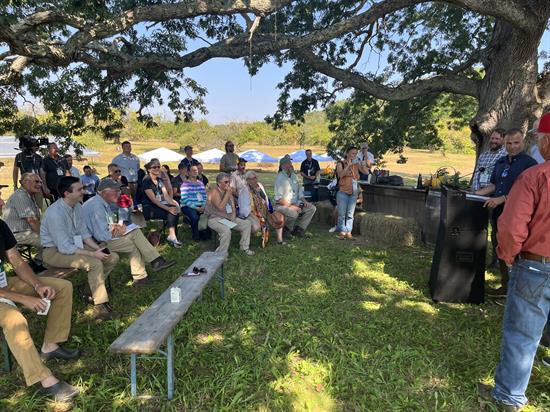Press Releases
Reps. Molinaro & Ryan Press for Changes to U.S. Farm Bill that Will Benefit Local FarmersLeaders urge increased access to federal technical and financial assistance for farms across New York and the nation
Washington,
September 7, 2023
Tags:
Agriculture
STONE RIDGE (Ulster County) — Demonstrating bipartisan support for Hudson Valley farmers, U.S. Reps. Marc Molinaro (R-NY-19) and Pat Ryan (D-NY-18) announced their joint commitment today to ensure the pending federal Farm Bill will meet the needs of hard-working local farms that supply fresh food to residents of the region and New York City and drive a thriving agricultural economy across the United States. The Congressmen spoke at Growing America (USA Farm Bill Gathering) held at Stone Ridge Orchard in Stone Ridge, where they highlighted specific recommendations, they are proposing to advance in the bill. Additional participants in the event included farmers and other agricultural stakeholders from across the region. Host farmer Elizabeth Ryan conducted a tour highlighting climate-friendly agricultural practices utilized at the orchard. The event was held in collaboration with Scenic Hudson, the Northeast Carbon Alliance, and the NY League of Conservation Voters Education Fund. The current Farm Bill will expire on September 30, 2023. Congress has been actively working on the bill, and there are significant opportunities to increase funding and expand programs, especially to underrepresented farmers. The Farm Bill, passed by the United States Congress roughly every five years, is arguably the single largest source of funding for agriculture and conservation across the nation. It addresses various aspects of agriculture, food, nutrition, and rural development, including: • Programs to address hunger and food insecurity (e.g., SNAP benefits and nutrition training) • Farm subsidies • Conservation programs • Crop insurance • Research and extension services • Investment in rural communities (e.g., jobs, housing, and infrastructure) • Agricultural trade issues • Renewable energy programs “Farmers are being asked to do more with less – to keep producing safe and affordable food, be thoughtful stewards of our environment, and break down barriers for individuals of all backgrounds and abilities,” said Representative and House Agriculture Committee Member Marc Molinaro. “As capable and dedicated as our farmers and farm families are, they cannot do this alone. Our work is focused now on listening and learning from farmers in Upstate New York so we can craft a Farm Bill that makes sure they have the resources and flexibility to have economic opportunities, preserve our natural resources, and reduce our impact on the environment. With this feedback, we will deliver a bill that moves us in a direction that ensures a sound, sustainable future for agriculture in Upstate New York and across the nation.” “Farmers and farm families make the conscious choice every day to raise the crops and livestock that sustain us. This hard and often thankless work frequently goes unnoticed, yet the role they play continues to grow in importance — to keep meeting increased demands for fresh, nutritious food and take steps to protect our planet,” said Representative Pat Ryan. “We need to embrace the farm community and make sure there is a path forward for their continued viability, as well as help usher in the next generation of farmers who will build on and improve farming practices that benefit everyone. I join my like-minded colleagues from every walk of life in supporting and advancing sound investments in agriculture that provide real, positive results for our farms and communities, in the Hudson Valley and across America.” “The local, family-owned farms throughout New York and Northeastern states provide a diverse array of food and farm products to residents of the region and country. They can also provide clean water, healthy forests, and the potential to reduce and slow the impacts of climate change,” said Scenic Hudson President Ned Sullivan. “Congressmen Molinaro and Ryan have demonstrated the depth of their understanding of these issues and the underlying economic interests of the region's farms as advocates at the nation's capital and through the introduction of supportive legislation. As the Farm Bill advances, it is now critical for their colleagues in Washington to listen carefully and support our hard-working farmers and their family farms by removing obstacles to the implementation of federal programs, enhancing technical assistance to farmers, and ensuring smart public policy that balances agricultural and environmental goals." “The 2023 Farm Bill is a tremendous opportunity for our country to build on recent climate wins like the Inflation Reduction Act," said New York League of Conservation Voters President Julie Tighe. “That historic legislation delivered nearly $20 billion for climate-smart agriculture and technical assistance for farmers, and it is vital that this funding remains committed to conservation.” Summary Initiatives Congressmen Molinaro and Ryan are championing, along with other measures to become part of or strengthen the 2023 Farm Bill: 1. Increased Technical Service Provider Access Act (H.R. 3036/S.1400) — Technical Service Providers (TSPs) help farmers access USDA conservation programs through hands-on, individualized assistance. 2. Naturally Offsetting Emissions by Managing and Implementing Tillage Strategies Act (NO EMITS, H.R. 4163) — The NO EMITS Act assists farmers with transitioning cropping systems to methods that achieve environmental goals while also addressing the economic risk posed by the transition. 3. Flooding Prevention Assessment, and Restoration Act (H.R. 5250) — This legislation creates flexibility within the USDA that will help communities restore flooded areas to pre-disaster levels, including the restoration of natural land, and enable them to manage the impacts of climate change. 4. Peer Learning Conservation Education Act (H.R. __ / S. __) — Bill in progress — This bill prioritizes on-farm activities that manage soil health and other natural resources and broadens the type of activities that are eligible for federal support. |



